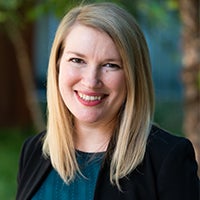October, 2024

Director, Religion and Public Life Center
At the Religion and Public Life Center, we talk a lot about how religious people and communities provide care and belonging to immigrants, especially in a global city like Houston. We also talk about the ways religion can be used to reinforce boundaries between 'us' and 'them' in ways that have negative consequences for the most marginalized. As a director, I have been tracking with concern the rise of anti-immigrant rhetoric in the public sphere and noting where religion intersects. We must be vigilant of when religion is used to draw sharp dividing lines, when it is used to cast other people (and entire groups of people) as un-worthy of care, dignity, or justice.
At the same time, we need more research that amplifies immigrant voices and helps us better understand the lived experiences of immigrants in our community. For example, this past month, we celebrated BI-RPLC graduate scholar Moses Biney who successfully defended his sociology master's thesis. Moses' research focuses on how religion can be a resource for African immigrants, promoting trust in medical healthcare and encouraging physical and mental well-being. Along with my Boniuk Institute colleagues, I also met with diverse religious and civic leaders from Houston who shared with us examples of inter-religious collaborations to address broader community issues like domestic violence, lack of access to medical information, as well as negative encounters with police and incarceration. Both experiences reminded me of how religion can be a positive resource that helps people feel a deeper sense of belonging, care, dignity, and justice where they live.
While religion can increase polarization, and contribute to even further marginalization of already marginalized groups, we cannot lose sight of how religious communities and everyday people within them are helping to provide a sense of home and belonging to those who need it the most.
Rachel C. Schneider
Director, Religion and Public Life Center
